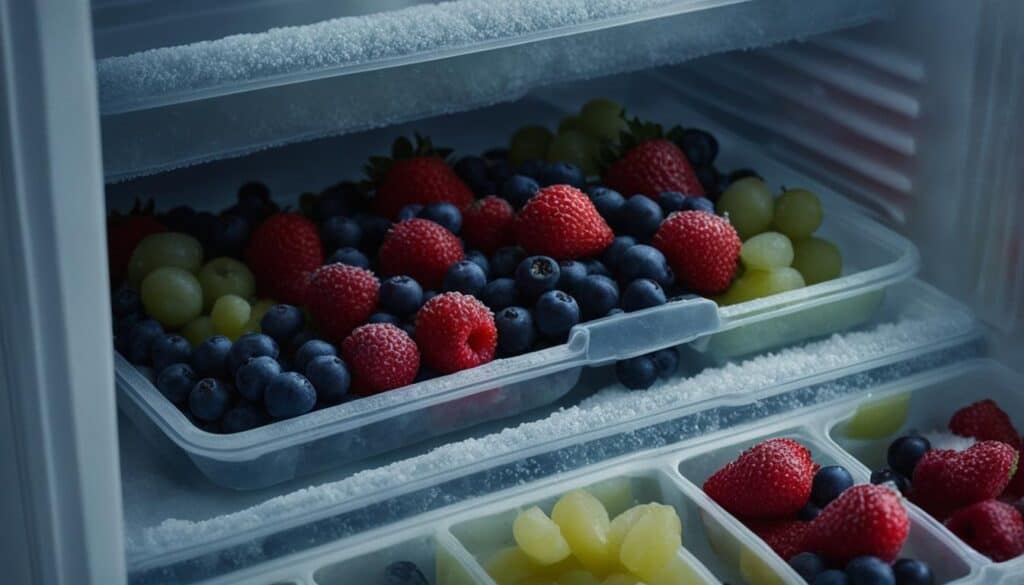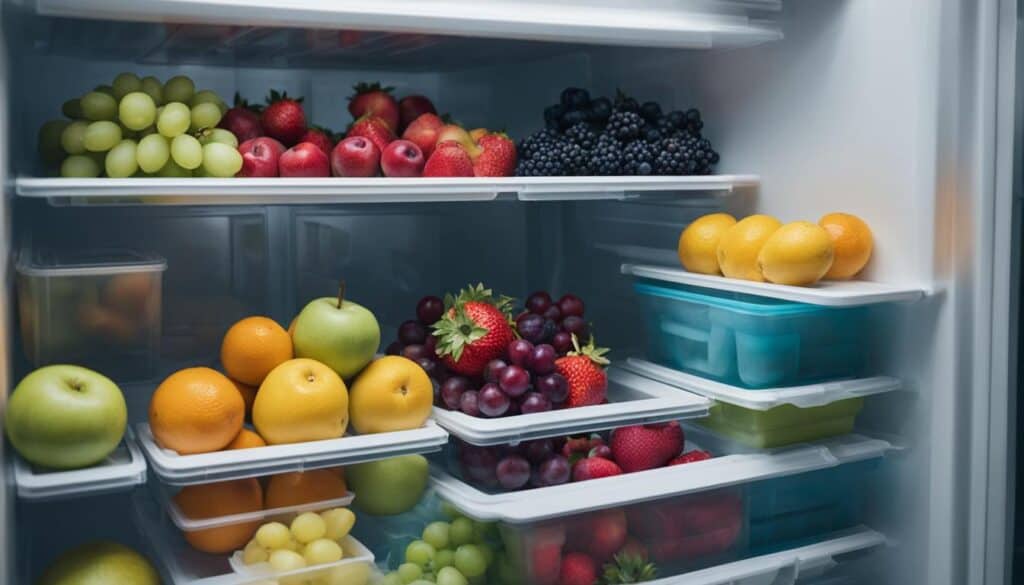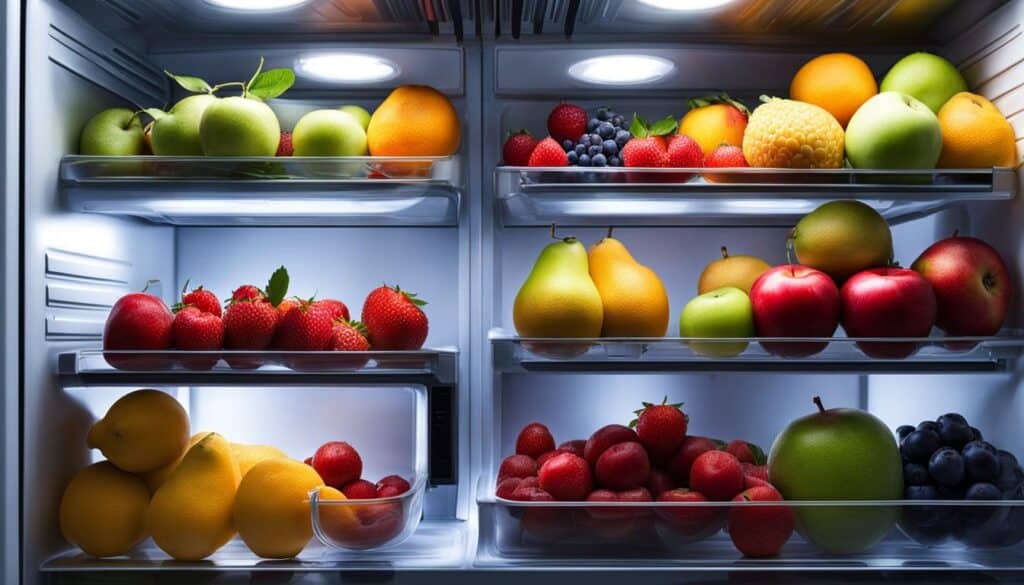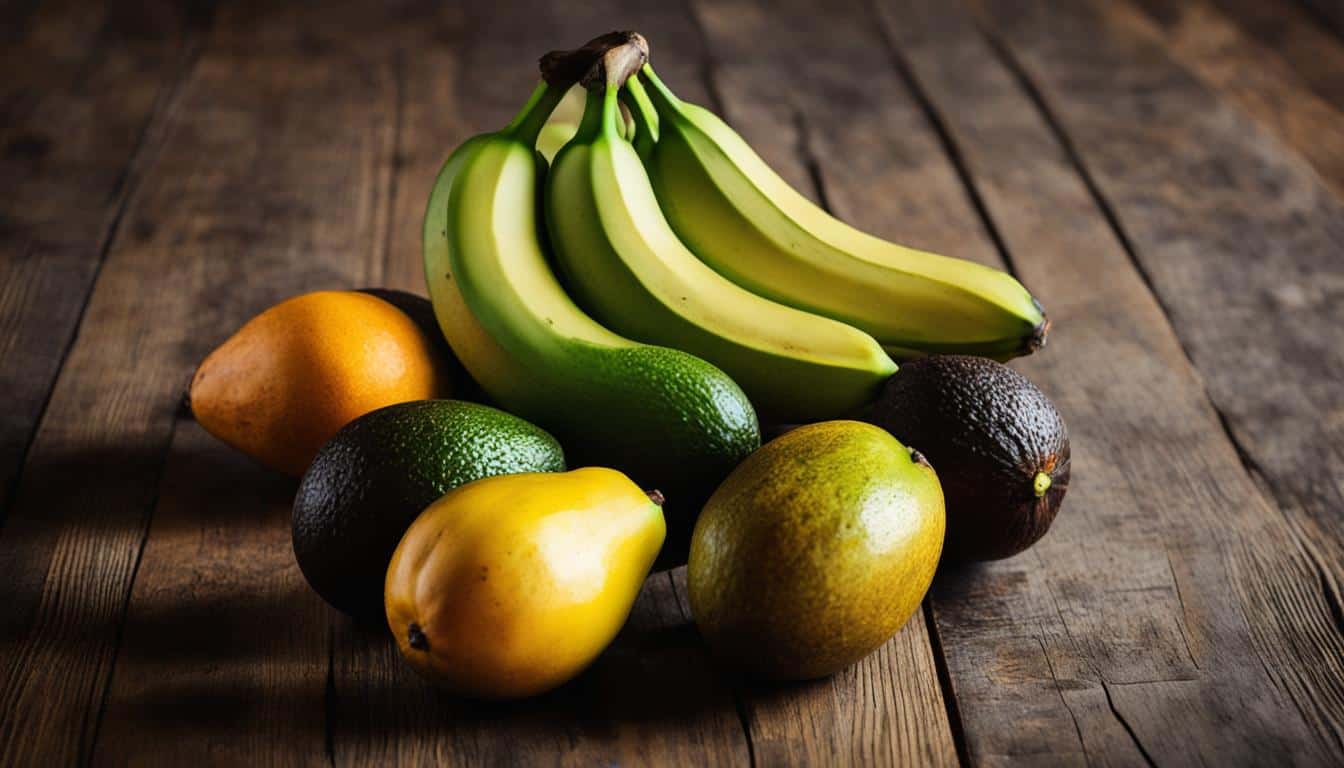Storing fresh fruits and vegetables is essential for maintaining their flavor and freshness. Whether you’re a fruit lover or simply want to make the most of your grocery purchases, knowing the best way to store fruits can ensure their longevity and quality.
But here’s the question: Does fruit need air in the fridge? The answer is, it depends. While some fruits thrive in a cool, well-ventilated environment, others are better off at room temperature.
In this article, I’ll discuss fruit storage tips, including refrigerating fruits, preserving fruits in the fridge, maintaining fruit quality, and more. Let’s explore the guidelines for fruit storage and find out which fruits need air circulation in the fridge.
Key Takeaways:
- Storing fruits correctly helps maintain their flavor and freshness.
- Some fruits need air circulation in the fridge, while others are best stored at room temperature.
- Guidelines for storing fruits in the fridge can help prolong their shelf life and prevent spoilage.
- Freezing and canning are additional methods to preserve fruits for extended storage.
- Following expert tips and utilizing storage guidelines can enhance the freshness and longevity of your fruits.
Fruits That Need Air Circulation in the Fridge
When it comes to storing fruits, some varieties require air circulation in the fridge to maintain their freshness and flavor for longer. These fruits benefit from exposure to air, which helps prevent spoilage and keeps them in optimal condition. Here are some fruits that need air circulation in the fridge:
- Apples (for more than 7 days): Apples can be stored in the fridge to prolong their shelf life, but it’s important to place them in a separate perforated plastic bag. This allows for air circulation, preventing the build-up of excess moisture and maintaining their crispness.
- Berries: Strawberries, blueberries, raspberries, and other types of berries should be stored in the fridge, but they should also be placed in a perforated container or bag. This allows air to circulate, reducing the risk of mold and prolonging their freshness.
- Cherries: Similar to berries, cherries should be stored in the refrigerator. To maintain their quality, place cherries in a perforated bag or container that allows air to flow around them.
- Figs: Figs are delicate fruits that benefit from air circulation. To store them in the fridge, place them in a container with ventilation or leave them loosely wrapped in a paper towel to allow for proper airflow.
- Grapes: To keep grapes fresh and juicy, store them in the fridge. It’s best to transfer them to a perforated bag or container to ensure adequate air circulation around the bunch.
Remember to use these fruits within 1-3 days for the best flavor and freshness. By providing them with the right amount of air exposure in the fridge, you can enjoy these fruits for an extended period.
Now that we’ve learned about the fruits that need air circulation in the fridge, let’s explore the fruits that should be ripened on the counter before refrigeration in the next section.
Fruits That Should Ripen on the Counter
When it comes to certain fruits, ripening on the counter before refrigeration is the best way to ensure optimal flavor and freshness. By allowing fruits like apricots, avocados, guava, kiwis, mangoes, melons, nectarines, papaya, peaches, bananas, and plums to ripen naturally at room temperature, you can enhance their taste and texture.
During the ripening process, these fruits undergo chemical changes that result in sweeter, juicier, and more vibrant flavors. Placing them in the fridge prematurely can interrupt this natural ripening process and compromise their taste.
Once these fruits have reached their peak ripeness on the counter, they can be moved to the refrigerator to slow down further ripening and prolong their shelf life. This method is especially beneficial if you have an abundance of ripe fruits and want to enjoy them over a longer period.
It’s worth noting that apples, when stored with other fruits, can release ethylene gas, which accelerates the ripening process. To prevent your other fruits from ripening too quickly, it’s best to keep apples separate in the fridge.
Benefits of Ripening Fruits on the Counter
Ripening fruits on the counter before refrigeration offers several advantages:
- Enhanced flavor: Allowing fruits to ripen naturally maximizes their sweetness and taste.
- Improved texture: Ripening on the counter ensures that fruits develop the desired texture, from soft and creamy avocados to juicy and tender peaches.
- Prolonged shelf life: Once fully ripened, refrigeration slows down the ripening process, extending the shelf life of these fruits.
- Better quality: By following this practice, you can enjoy fruits at their best quality, ensuring a delightful culinary experience.
Remember, different fruits have different ripening times, so it’s essential to check them regularly for signs of ripeness. You can assess ripeness by gently pressing the fruit and checking for a slight give or smelling its aroma.
| Fruit | Ripening Time (Approx.) |
|---|---|
| Apricots | 2-3 days |
| Avocados | 2-5 days |
| Bananas | 2-5 days |
| Guava | 2-3 days |
| Kiwis | 2-3 days |
| Mangoes | 4-7 days |
| Melons | 3-7 days |
| Nectarines | 2-3 days |
| Papaya | 2-3 days |
| Peaches | 2-3 days |
| Plums | 2-3 days |
Recommended Storage Times for Fruits in the Fridge
When it comes to storing fruits in the fridge, it’s important to know how long they can stay fresh. Here are the recommended storage times for various fruits:
| Fruit | Storage Time in the Fridge |
|---|---|
| Apples | 3-4 weeks |
| Apricots | 4-5 days |
| Avocados | 3-5 days |
| Blueberries | 1-2 weeks |
| Cherries | 4-7 days |
| Cranberries | 3-4 weeks |
| Grapes | 5-7 days |
| Kiwis | 5-7 days |
| Mangoes | 5-7 days |
| Melons | 7-10 days |
| Nectarines | 3-5 days |
| Oranges | 2-3 weeks |
| Peaches | 3-5 days |
| Pears | 5-7 days |
| Pineapples | 3-5 days |
| Plums | 3-5 days |
| Pomegranates | 1-2 months |
| Raspberries | 2-3 days |
| Rhubarb | 5-7 days |
| Strawberries | 3-5 days |
| Watermelon | 2 weeks |
These are general guidelines, but it’s important to use your judgment when determining if a fruit is still safe to eat. Remember to check for any signs of spoilage or discoloration before consuming.
Freezing Fruits for Extended Storage
If you can’t consume your fruit right away, freezing is a great option to extend its shelf life. Freezing fruits allows you to preserve their flavors and nutrients, making them available for later use. Whether you have an abundance of seasonal fruits or want to stock up during a sale, freezing is a convenient way to store fruits for long periods.
To freeze fruits, follow these simple steps:
- Wash the fruits gently under cool running water to remove any dirt or debris. Pat them dry with a clean towel.
- Prepare the fruits by removing any stems, seeds, or pits as necessary.
- Spread the fruits in a single layer on a cookie sheet lined with parchment paper.
- Place the cookie sheet in the freezer and let the fruits freeze until they are hard. This usually takes a few hours, depending on the type of fruit.
- Once frozen, transfer the fruits to labeled freezer bags or containers. Be sure to remove as much air as possible from the bags to prevent freezer burn.
- Label the bags or containers with the name of the fruit and the date of freezing.
- Return the fruits to the freezer and store them at temperatures below 0°F (-18°C).
When storing fruits in the freezer, it’s essential to use proper packaging to maintain their quality. Freezer bags or airtight containers are ideal for preventing freezer burn and keeping the fruits fresh. Additionally, properly labeled packaging helps you identify the fruits and keep track of their storage duration.
Most fruits can be stored in the freezer for up to one year, although the quality may start to decline over time. It’s a good practice to consume the frozen fruits within six to nine months for the best flavor and texture. Some fruits, like berries, may develop a slightly different texture after freezing, but they can still be enjoyed in smoothies, baked goods, or as toppings.
If you’re unsure about the suitability of a specific fruit for freezing, consult reputable sources or reach out to your local agricultural extension office for guidance.

“Freezing fruits is an excellent way to preserve their flavors and nutrients, allowing you to enjoy them even when they are out of season.” – Nutritionist Lisa Johnson
Freezing fruits not only extends their availability but also allows you to lock in the nutrients and flavors for future use. Whether you plan to make smoothies, fruit sauces, or baked goods, frozen fruits can be a versatile addition to your pantry.
Storing Canned Fruits
When it comes to storing canned fruits, there are a few key guidelines and best practices to keep in mind. Canned fruits have a relatively long shelf life, typically ranging from 1 to 2 years. To ensure maximum freshness and quality, it’s important to follow proper storage methods.
First and foremost, it is advisable to label your canned fruits with the date of purchase. This simple step allows you to keep track of their freshness and easily identify older cans that should be consumed sooner rather than later.
Additionally, some canned fruits may come with a “use by” date. This date is provided by the manufacturer and indicates the recommended period of best quality for the product. While canned fruits can often still be safe to consume beyond the “use by” date, it’s generally best to adhere to these guidelines for optimal flavor and texture.
By storing your canned fruits properly and being mindful of their freshness, you can enjoy these convenient and delicious options for an extended period of time.
Canned Fruit Storage Guidelines:
- Label cans with the date of purchase
- Check for any “use by” dates provided by the manufacturer
- Consume canned fruits within the recommended shelf life of 1-2 years
Remember to always check the cans for any signs of damage or bulging before consuming. If you notice any abnormalities or suspect that the contents may be spoiled, it’s best to err on the side of caution and discard the can.
Now that we’ve covered the essentials of storing canned fruits, let’s move on to additional tips and techniques for fruit storage and preservation.
Additional Tips for Fruit Storage and Preservation
Besides refrigeration and freezing, there are a few more tips to keep your fruits fresh and maximize their shelf life.
- Avoid washing fruits until you’re ready to eat them. Added moisture can promote spoilage, so it’s best to refrain from washing fruits until you’re ready to enjoy them. This helps to maintain their natural protective layer and extends their freshness.
- Store citrus fruits in a cool place with good airflow. Citrus fruits like oranges and lemons should be stored in a cool, dry place with proper ventilation. Avoid keeping them in an airtight container, as this can cause moisture buildup and lead to mold or decay.
- Remove any bands or twist ties from greens like leafy vegetables or herbs and store them in airtight containers with a damp cloth. This helps to prevent greens from drying out and losing their crispness, ensuring that they stay fresh for longer periods.
By following these additional tips, you can prolong the freshness of your fruits and preserve their delicious flavors.

| Fruit Storage Tips | Maximizing Fruit Freshness |
|---|---|
| Avoid washing fruits until ready to eat | Store citrus fruits in a cool, ventilated area |
| Remove bands or twist ties from greens | Store greens in airtight containers with a damp cloth |
| Refrigerate fruits that require air circulation | Freeze fruits for extended storage |
| Allow fruits to ripen on the counter before refrigeration | Store canned fruits in a cool, dry place |
Conclusion
Proper fruit storage is crucial for maintaining the flavor and freshness of your favorite fruits. By following optimal fruit storage practices, you can ensure that your fruits stay fresh and delicious for longer. Whether it’s refrigerating fruits that benefit from air circulation or ripening certain fruits on the counter before refrigeration, understanding the best techniques will help preserve their quality.
Freezing and canning are also effective methods to extend the shelf life of fruits. By freezing fruits for later use or storing canned fruits, you can enjoy the goodness of fruits even when they’re out of season.
Remember, it’s important to use your judgment and common sense when determining if a fruit is still safe to eat. Check for any signs of spoilage or decay and discard any fruits that don’t meet the freshness standards.
Optimizing fruit freshness and maintaining their quality requires a combination of proper storage techniques, knowledge of individual fruit needs, and regular inspections. By implementing these fruit freshness tips, you can enjoy delicious and nutritious fruits throughout the year.

Let the burst of flavors and vibrant colors of fresh fruits add joy to your meals. Explore different types of fruits, experiment with new recipes, and savor the natural sweetness nature has to offer.
Additional Guidelines and Tips for Fruit Storage
When it comes to fruit storage, there are advanced techniques and expert tips that can help preserve freshness and extend the shelf life of your favorite fruits. UC Davis Postharvest Technology and the Ecology Center provide valuable insights and specific recommendations to ensure your fruits stay fresh for longer periods.
For optimal storage, it is important to follow the specific guidelines for different fruits. For example, apples should be stored in a cool place, such as a basement or cellar, to maintain their texture and flavor. Ripe avocados, on the other hand, can benefit from being kept in a paper bag, which helps accelerate the ripening process.
When storing fruits alongside root vegetables, it’s advisable to remove any greens and store them separately. This prevents the greens from drawing moisture from the vegetables, helping to maintain their crispness and quality over time.
Implementing these additional guidelines and expert tips will allow you to take your fruit storage game to the next level. By following these advanced techniques, you can ensure that your fruits stay fresh, flavorful, and ripe for longer, maximizing your enjoyment and minimizing waste.
FAQ
Does fruit need air in the fridge?
Yes, some fruits need air circulation in the fridge to stay fresh, while others are better off at room temperature. Let’s explore the guidelines for refrigerating fruits and find out which fruits need air in the fridge.
Which fruits need air circulation in the fridge?
Fruits that need air circulation in the fridge include apples (for more than 7 days), berries, cherries, figs, and grapes. These fruits should be stored in separate, perforated plastic bags in the fridge to maintain their freshness and prevent spoilage.
Which fruits should ripen on the counter?
Fruits that should ripen on the counter before refrigeration include avocados, kiwis, nectarines, peaches, and plums. These fruits should be allowed to ripen at room temperature first and then can be stored in the fridge to prolong their shelf life.
What are the recommended storage times for fruits in the fridge?
The recommended storage times for various fruits in the fridge are as follows: apples (3-4 weeks), apricots (4-5 days), avocados (3-5 days), blueberries (1-2 weeks), cherries (4-7 days), cranberries (3-4 weeks), grapes (5-7 days), kiwis (5-7 days), mangoes (5-7 days), melons (7-10 days), nectarines (3-5 days), oranges (2-3 weeks), peaches (3-5 days), pears (5-7 days), pineapples (3-5 days), plums (3-5 days), pomegranates (1-2 months), raspberries (2-3 days), rhubarb (5-7 days), strawberries (3-5 days), and watermelon (2 weeks).
How can I freeze fruits for extended storage?
To freeze fruits, wash them gently, spread them in a single layer on a cookie sheet, and place them in the freezer until they are hard. Once frozen, transfer the fruits to labeled freezer bags or containers. Fruits can generally be stored in the freezer for up to one year.
How long can canned fruits be kept?
Canned fruits can be kept for 1-2 years. It is advisable to label the cans with the date of purchase to keep track of their freshness. Some canned fruits may have a “use by” date, which indicates the recommended period of best quality determined by the manufacturer.
What are some additional tips for fruit storage and preservation?
Here are some additional tips for fruit storage and preservation: avoid washing fruits until you’re ready to eat them to prevent added moisture; store citrus fruits in a cool place with good airflow, never in an airtight container; remove any bands or twist ties from greens and store them in airtight containers with a damp cloth to prevent them from drying out.
Are there any additional guidelines and tips for fruit storage?
Yes, UC Davis Postharvest Technology and the Ecology Center provide additional guidelines and tips for fruit storage. These experts recommend specific storage recommendations for different fruits, such as storing apples in a cool place or placing ripe avocados in a paper bag. They also advise removing greens from root vegetables and storing them separately to enhance freshness and longevity.





Leave a Reply